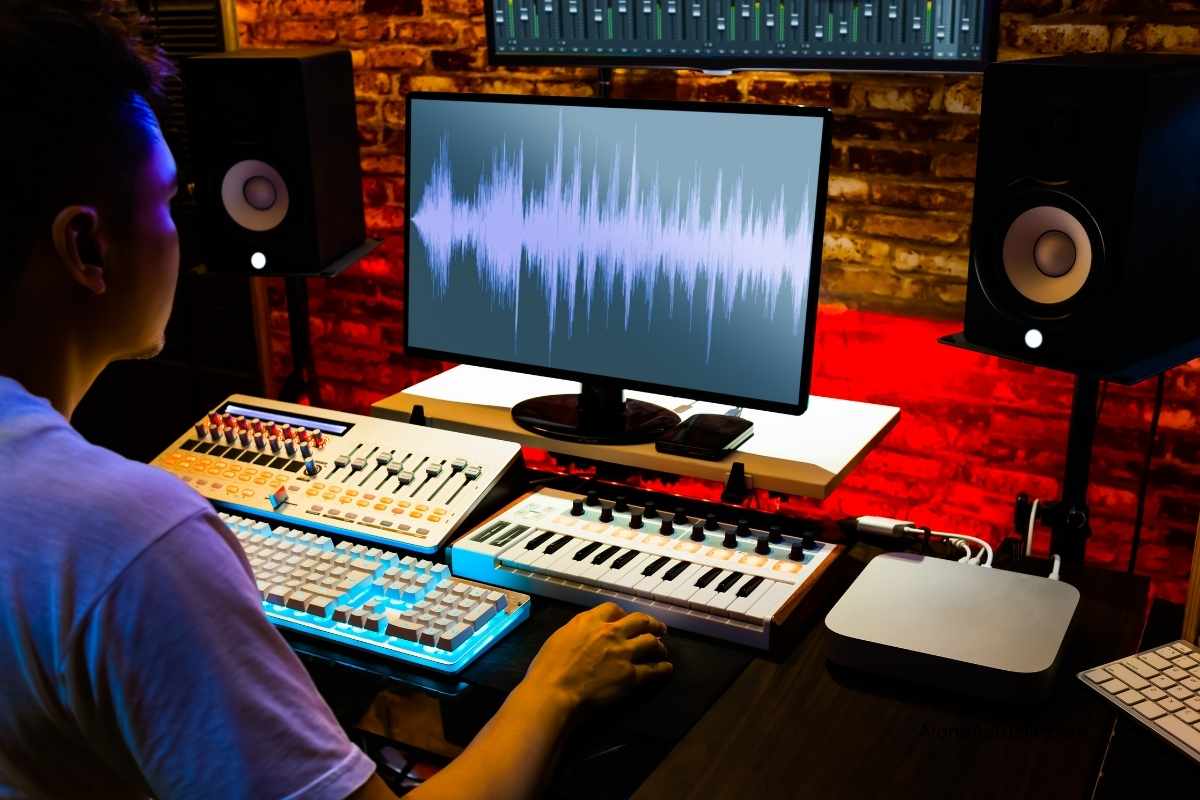25 Music Apps Spotify Doesn’t Want You to Know About
You know how Spotify has kind of become the default music app for almost everyone?
Don’t get me wrong—it’s good, but it’s not perfect.
Between the rising subscription prices, ads on the free plan, and features locked behind “premium only,” it’s no surprise that more and more people are starting to look for better options.
And you know what… Spotify isn’t the only game in town.
In fact, there are a ton of music apps out there that give you features Spotify doesn’t, whether that’s higher-quality audio, better playlists, more downloads, or just a completely different vibe.
Some are huge names you already know, and some are hidden gems you’ve probably never heard of but totally should.
So if you’ve been wondering what else is out there, I’ve rounded up 25 music apps Spotify doesn’t want you to know about.
1. Apple Music
If there’s one app that actually gives Spotify a run for its money, it’s Apple Music.
The sound quality is top-notch—you get lossless and even Dolby Atmos tracks without paying extra, something Spotify still hasn’t pulled off.
The app also integrates beautifully with iPhones, Apple Watch, and Siri, so if you’re in the Apple ecosystem, it just feels seamless.
What really stands out, though, is the curated playlists.
Instead of just algorithm-driven mixes, Apple Music leans heavily on real editors and artists, which makes the recommendations feel way more “human.”
Plus, you can download as much as you want for offline listening.
Sure, it’s paid only—no free tier here—but if you want better sound and tighter iPhone integration, Apple Music easily beats Spotify in those areas.
Also Read: 31 Best Offline Music Apps to Listen Without Wi-Fi
2. YouTube Music
YouTube Music is like the best of both worlds—streaming and YouTube combined.
The biggest win here is the sheer size of its library.
If a song exists online, chances are you can find it on YouTube Music, whether it’s official tracks, live performances, or those rare remixes Spotify usually doesn’t have.
The app also makes switching from video to audio super easy.
You can start watching a music video and then just tap to keep listening with the screen off—perfect for when you don’t want the visuals but still want the track.
Playlists are another strong point, especially because they can mix official songs with user uploads, giving you more variety.
It does have ads on the free plan, but the Premium upgrade removes those and lets you download tracks.
If you’re tired of Spotify’s limited catalog, YouTube Music feels like a serious upgrade.
Also Read: 21 Free Music Apps for Unlimited Listening
3. Amazon Music Unlimited
Amazon doesn’t always get the hype in the music space, but honestly, Amazon Music Unlimited is way better than most people think.
For starters, it’s bundled at a discount if you already have Prime, which makes it cheaper than Spotify.
And unlike Spotify’s free tier, Amazon’s catalog feels fully open—millions of songs without the same annoying restrictions.
What sets it apart, though, is the audio quality.
You get HD and Ultra HD tracks included in the plan, which means you’re streaming studio-level sound without paying extra.
Add in Alexa integration, and suddenly you can play any song in your house just by asking out loud.
It may not have Spotify’s social features, but if you care about sound and price, Amazon Music Unlimited easily makes a strong case as the better deal.
4. Tidal
Tidal is the app people go to when they’re serious about sound.
While Spotify is still dragging its feet on high-res audio, Tidal has been offering HiFi and even Master Quality tracks for years.
If you’re the type who notices the difference between regular and lossless, this alone makes Tidal a huge step up.
But it’s not just about the sound. Tidal has built its brand around being more artist-friendly.
They pay out higher royalties compared to Spotify, which makes a lot of musicians actively recommend the platform.
The playlists and exclusives are also solid—you’ll find early releases and behind-the-scenes content you won’t see elsewhere.
It’s definitely not the cheapest option, but if audio quality and supporting artists matter to you, Tidal feels like a better choice than Spotify in almost every way.
5. Deezer
Deezer doesn’t always get the spotlight, but it’s one of those apps that quietly does a lot of things better than Spotify.
The standout feature is something called Flow—an AI-driven mix that constantly learns your taste and serves up music you’ll actually like.
It feels less robotic than Spotify’s Discover Weekly and more like a friend who really knows your vibe.
You also get a massive global catalog, podcasts, and even lyrics built right in.
Deezer’s HiFi plan gives you lossless audio, and unlike Spotify, it’s already available worldwide.
Plus, it supports more devices—smart TVs, speakers, gaming consoles—you name it.
The free tier is solid, but the premium unlocks offline mode and skips without the annoying restrictions.
If you’re bored of Spotify’s same-old playlists, Deezer might surprise you.
6. Pandora
Pandora is kind of the OG when it comes to personalized music, and honestly, it still does that part better than Spotify.
Instead of just playlists, Pandora works more like a smart radio station.
You pick a song, artist, or genre, and it builds a never-ending stream of music that matches your taste. The more you thumbs-up or thumbs-down tracks, the smarter it gets.
What’s cool is that it feels effortless—you don’t have to keep searching for what to play next.
Pandora just keeps serving up music that fits your mood.
The free version works fine if you don’t mind ads, but Pandora Plus and Premium let you skip more, listen offline, and even make your own playlists.
If you like a “set it and forget it” style of listening, Pandora can actually feel more enjoyable than Spotify’s algorithm.
7. SoundCloud
SoundCloud is where you go when you want music that isn’t everywhere else.
Spotify’s catalog is huge, sure, but it’s mostly mainstream and licensed stuff.
On SoundCloud, you’ll find indie artists, underground remixes, mashups, and tracks uploaded directly by creators. It feels more raw and fresh—like you’re ahead of the curve instead of just following the charts.
The free plan already gives you tons to explore, but with SoundCloud Go+ you can unlock offline listening and remove ads.
Another big plus is the community vibe—you can comment on specific moments in a song and actually interact with other listeners and artists.
If you’re bored with Spotify’s polished but predictable playlists, SoundCloud gives you access to the kind of music that feels alive and constantly changing.
8. Napster
Yeah, Napster is still around—and honestly, it’s way better than most people expect.
Once known for the wild west of music downloads, today Napster is a legit streaming service with a catalog that rivals Spotify.
The difference… It’s a lot more straightforward and focused on music, without pushing podcasts or random extras.
The sound quality is excellent, and Napster also supports HiFi streaming if you’re after that richer audio.
What’s cool is how clean and simple the interface feels—you just get music without the clutter. Plus, it works on basically every device, from your phone to smart speakers.
It may not have the same name recognition anymore, but Napster is a hidden gem that often flies under the radar.
If you just want a pure music-first experience, this is one app that easily outshines Spotify.
9. Qobuz
Qobuz is the go-to app for audiophiles who care about every little detail in their music.
While Spotify still hasn’t delivered lossless audio, Qobuz has been offering hi-res tracks for years—up to 24-bit/192kHz.
That means if you’ve got good headphones or speakers, you’ll actually hear the difference.
What makes it stand out even more is that it’s not just a streaming service—it’s also a music store.
You can actually buy and download hi-res albums to keep forever, something Spotify doesn’t even touch.
The app leans heavily into curated playlists, artist stories, and in-depth album booklets, so it feels like it’s built for people who really love music, not just casual listeners.
It’s pricier than Spotify, but for pure sound quality and music ownership, Qobuz leaves it in the dust.
10. Audiomack
Audiomack is one of those apps that feels like a hidden treasure compared to Spotify.
The big win here? It’s completely free, and you can even download songs for offline listening without paying a dime.
That alone makes it stand out, since Spotify locks offline mode behind Premium.
The app leans heavily into hip-hop, rap, Afrobeat, and emerging genres, so you’ll find tons of tracks from up-and-coming artists alongside bigger names.
It’s more about discovery than just repeating what’s already popular, and that’s what makes it exciting.
There are ads on the free plan, but honestly, they’re not too intrusive.
If you want an affordable way to explore new music, support indie artists, and still get offline listening, Audiomack feels like a seriously underrated alternative to Spotify.
11. Wynk Music
Wynk Music is a big deal in India, and while it’s not as popular worldwide, it’s worth mentioning because of how much value it packs in.
Backed by Airtel (a major telecom company there), Wynk gives users unlimited streaming and even downloads.
If you’re on an Airtel plan, a lot of those features come free, which makes it incredibly budget-friendly.
The catalog mixes Bollywood, regional Indian tracks, and global hits, so it’s got something for everyone.
It also works offline, which is a big plus if you’re traveling.
For international users, it may not always be the best pick since some features are tied to Airtel, but as a regional alternative, it’s proof that Spotify isn’t the only option dominating the scene.
12. Gaana
Gaana is another music giant from India, and it’s often seen as the local answer to Spotify.
It offers a massive library of Bollywood, regional Indian songs, and international hits, making it a go-to app for millions of listeners there.
The free tier gives you access to plenty of music with ads, while the paid plan unlocks downloads and higher-quality streaming.
For international users, Gaana can still be fun if you’re into exploring Bollywood or Indian pop, but the real value shows if you’re actually based in India—it’s more affordable than Spotify and tailored to regional tastes.
Think of it as Spotify, but designed with a stronger focus on Indian music culture.
13. JioSaavn
JioSaavn is another India-based music app that directly competes with Spotify, and it’s actually one of the most polished regional alternatives out there.
The catalog blends Bollywood, regional Indian tracks, and global hits from all the big labels, so it feels like a mix of local flavor and international reach.
What makes JioSaavn interesting is its pricing.
If you’re in India and already using Jio (a massive telecom provider), the premium plan comes bundled at a discount, making it way cheaper than Spotify.
The app also supports offline downloads, curated playlists, and podcasts, giving it that full streaming experience.
For international readers, it might not be as practical unless you’re into Indian music specifically.
But inside its region, JioSaavn is easily considered a better value than Spotify.
14. Anghami
Anghami is the go-to music app in the Middle East and North Africa, and it’s built specifically with that audience in mind.
The app has a massive catalog of Arabic music, along with all the international hits you’d expect.
It also leans into cultural relevance—curated playlists for Ramadan, local charts, and regional exclusives you won’t see on Spotify.
One thing that makes Anghami stand out is its social side.
You can share music stories, follow friends, and even see what people around you are listening to, giving it more of a community vibe than Spotify.
Premium unlocks downloads and higher audio quality, but even the free version works well for casual listening.
For listeners outside the region, Anghami is worth checking out if you’re curious about Middle Eastern music.
Inside its home turf, though, it’s often preferred over Spotify.
15. Boomplay
Boomplay is the biggest music app in Africa, and it’s growing fast.
The app has over 90 million songs, mixing international hits with a huge catalog of African artists you probably won’t find on Spotify.
That makes it the go-to platform if you want to explore Afrobeats, gospel, and regional hits alongside mainstream global music.
It also doubles as more than just a streaming service—you can get lyrics, music videos, and even trending news about your favorite artists inside the app.
The free plan comes with ads, but Boomplay Premium unlocks offline downloads and unlimited skips at a much lower price point than Spotify.
For global listeners, it’s a great way to discover African music scenes that don’t always get spotlighted elsewhere.
In its home market, Boomplay is often seen as the better option simply because it understands local taste.
16. Idagio
Idagio is totally different from Spotify because it focuses only on classical music.
If you’ve ever tried searching for symphonies or concertos on Spotify, you know how messy it can get—tracks scattered, hard to follow, and playlists that don’t make much sense.
Idagio fixes that.
The app is built for classical listeners, so you can search by composer, orchestra, soloist, or even specific recordings.
It also organizes works properly (movements grouped together, not shuffled around), which makes the experience feel more natural for classical fans.
Streaming quality is lossless, and there are curated playlists for moods like “relaxing piano” or “baroque essentials.”
If you love classical, Idagio is hands-down a better option than Spotify.
For anyone else, it’s a niche app, but for the right audience, it’s the ultimate upgrade.
17. Primephonic
Primephonic was another streaming app built purely for classical music fans, and it quickly became known for doing what Spotify couldn’t—making classical easy to explore.
Instead of just dumping tracks in a giant catalog, it let you browse by composer, era, instrument, or even conductor, which made a huge difference for serious listeners.
The sound quality was also stellar, offering high-res audio that made orchestral recordings come alive.
Playlists were curated by musicologists, not just algorithms, so everything felt more thoughtful.
Here’s the catch: Primephonic was acquired by Apple, and much of its tech now powers Apple Music Classical.
So while the standalone app doesn’t exist anymore, its influence lives on.
If you’re a classical listener frustrated with Spotify, Apple Music Classical is basically the next step that carries Primephonic’s DNA.
18. Bandcamp
Bandcamp isn’t your typical streaming app, but that’s exactly why it stands out compared to Spotify.
Instead of pushing mainstream hits, Bandcamp is all about indie artists and giving them a fair shot.
Musicians upload their own work, set their own prices, and actually get a much bigger cut of the revenue than they ever would from Spotify streams.
You can stream music through the app, buy albums or singles to keep forever, and even discover hidden gems across every genre you can imagine.
The community vibe is strong here—fans can follow artists, leave messages, and directly support creators.
If you’re tired of Spotify’s corporate feel and want to explore music that feels personal, raw, and independent, Bandcamp is hands-down the better choice.
It’s less about charts, more about discovery.
19. Evermusic
Evermusic is perfect if you’ve got your own music collection and don’t want to rely on Spotify’s library.
Instead of streaming from a central catalog, this app lets you upload or connect your songs from cloud services like Google Drive, Dropbox, or OneDrive and stream them anywhere.
Basically, it turns your own files into a personal Spotify alternative.
It also supports offline playback, multiple audio formats (including FLAC for lossless), and even built-in equalizers so you can tweak the sound exactly how you like.
If you still have a stash of MP3s or you’re the type who buys albums instead of just streaming, Evermusic makes it incredibly easy to organize and play them on your iPhone.
It’s not a “social” app like Spotify, but for people who want full control over their music, Evermusic feels like a smarter choice.
20. Musicolet
Musicolet is one of those underrated gems that makes you wonder why Spotify doesn’t offer half these features.
It’s a completely free, offline-first music player designed for people who already have their own MP3s or downloads. No ads, no internet required—it just works right out of the box.
What makes it shine is its smart organization.
You can create multiple queues (not just one playlist), set up sleep timers, and even edit tags or album art directly inside the app.
It’s lightweight, fast, and doesn’t drain your battery like Spotify often does.
If you’re tired of streaming and just want an offline player that gives you full control over your music, Musicolet is miles ahead of Spotify in that space.
21. JetAudio HD Music Player
JetAudio HD is one of those classic music players that’s been around forever, and it’s still better than Spotify in some key ways.
Instead of just giving you a “play” button, JetAudio lets you fine-tune everything with a powerful 20-band equalizer, sound effects, and playback controls.
If you’re the type who loves tweaking bass, treble, or surround effects, this app is a dream.
It supports just about every audio format you can throw at it, from MP3s to FLAC, and it works offline without issue.
You can even add crossfades, speed controls, and reverb to your songs—features Spotify doesn’t bother with.
If you want more than just passive listening and actually enjoy customizing your sound, JetAudio HD easily beats Spotify’s one-size-fits-all approach.
22. Pulsar Music Player
Pulsar is one of those sleek, no-nonsense apps that just does music right.
Unlike Spotify, which often feels cluttered with podcasts, ads, and upsells, Pulsar keeps things clean and focused on your songs.
It’s lightweight, fast, and works offline, making it a perfect choice if you’ve got your own library of MP3s.
The interface is gorgeous—minimal but modern—and it automatically organizes your tracks by album, artist, and genre.
You also get built-in support for gapless playback, smart playlists, and even Chromecast streaming if you want to throw your music onto bigger speakers.
It may not have a giant online catalog like Spotify, but if you want a smooth, ad-free offline player that doesn’t drain your battery, Pulsar easily wins.
23. Poweramp
Poweramp is kind of a legend in the music player world, especially for Android users, and it absolutely outshines Spotify when it comes to customization.
The built-in equalizer is insanely powerful, with bass boost, treble adjustments, reverb, and even stereo expansion.
Basically, you can make your music sound exactly the way you want it.
It supports just about every audio format (MP3, FLAC, WAV, you name it) and works completely offline.
The interface is modern and super responsive, with cool visualizations and album art options that make listening feel more personal.
Spotify is great for streaming, sure, but Poweramp is for people who own their music and want full control over how it sounds.
If that’s you, this app leaves Spotify in the dust.
24. Shuttle Music Player
Shuttle is one of those music apps that proves simple can still be better.
It’s lightweight, fast, and designed for offline playback, so you’re not dealing with ads, streaming limits, or constant premium reminders like on Spotify.
The interface feels modern and clean, with features like gapless playback, sleep timers, and automatic artwork downloads.
You also get built-in EQ controls to tweak your sound, which is something Spotify still doesn’t give you on mobile.
It’s not overloaded with extras, but that’s the point—Shuttle just makes listening to your own music files smooth and frustration-free.
For people who want a minimal, offline-first experience, Shuttle feels way more user-friendly than Spotify.
25. AIMP
AIMP might not be a household name, but for people who love having total control over their music, it’s a powerhouse.
This app supports just about every audio format under the sun—MP3, FLAC, WAV, AAC, and more—making it one of the most versatile players out there.
What really sets it apart from Spotify is the customization.
You get advanced equalizer settings, sound effects, playback speed control, and even the ability to manage playlists with surgical precision.
It’s also lightweight, fast, and works completely offline, so no internet, no problem.
Spotify is all about streaming convenience, but AIMP is about precision and ownership.
If you like fine-tuning your sound and having your music exactly the way you want it, AIMP easily wins.
My Final Take
Spotify might still be the biggest name in streaming, but once you step outside its bubble, you realize it’s not the only way to listen.
From heavyweights like Apple Music, YouTube Music, and Tidal to hidden gems like Musicolet, Evermusic, and AIMP, there’s a whole world of apps that do things Spotify either can’t or won’t.
Some of these apps give you better sound quality, some are cheaper, and some just make music feel more personal and fun again.
And that’s the beauty—you don’t have to settle for one-size-fits-all.
So whether you’re an audiophile chasing lossless tracks, someone who wants free offline downloads, or just curious about new music scenes around the world, there’s a Spotify alternative out there for you.
Try a couple, find your fit, and you might never look back.





